dear little voice,
lately, i have not been feeling so strong.
i have problems, you see, with an unsympathetic stomach, and the pain wakes me at night.
but i have been taking care of myself in the usual ways;
i lie in the garden and read from any page opened.
on saturdays i walk all day and then I walk toward the Sea. i buy myself fruit and nuts from the market, and by the harbour i sit and watch the gulls float nowhere endlessly.
sometimes i take off my shoes so that i can walk among the seaweed and the water; sifting through the lank coils and whitened timbers like something homesick for where i do not know.
i fill notebooks and leave spaces for the things i find— things that take on a new preciousness because they were not passed over: clusters of collected husks, hulls, shells, scavenged boats of milkweed pods, rattlesnake, grass and clover; meadows of dried weeds and aster seeds: yarrow, goldenrod and chicory later tucked and sent in envelopes to the people i love.
when it grows dark the air is always warm and soft and everything is beautiful. often there is nobody to share it with or anyone to tell.
sometimes in these moments i quietly believe that i have failed to have some extraordinary and implacable ambition. here, on my knees before the world, my hands mixed up in the intimate place of my feet, i think of icarus. i think of wings and sun and flight.
but then I recall how each day I seem to think less and less about myself, and i smile.
i am doing my best; my best like at sixteen dreaming of Whitman, of the gentle Moon and distant places and the creek that burrowed its way from the place i called home to where i did not know, and how i had to know the earth well in order to follow it. and how i didn’t. not at all.
today i fell asleep in the afternoon, reading Borges with the old windows all open and i dreamed of colour and of form and of older days in Barcelona, of sardines and bread, of the watchman wandering serene with his lamp, of the wineshops half open at night, of the words vida luna, of figtrees and Alameda and the sheer perfection of James Joyce, of every rose garden and every sentence I have ever read that has never left me, and all the strange little houses where I was so on my own and the earth was so beautiful that I forgot to want things.
i awoke after the chirp and weave of birds had silenced, alone and cold and fascinating in god’s imagination: in how Freedom is like this: forgetting that it matters— how distant you are, how small in the pool of the world’s eye.
i have wondered often in secret whether my happiness is my weakness. even my terrible sentences somehow please me.
but i doubt my own judgment.
i think tomorrow I will take my book and sit at the table by the harbour.
how free; how lovely to be a thing that passes over nothing.
a scavenging ars.
so, little voice.
your Poem—
(and you know i would never have forgotten; even if there was a brief and startling moment where you were afraid i may have.
you know you are not something i intend to ever pass over.)
but, you see, for a moment too i was overcome; distracted by the sheer volume of my own existence.
this is something fitting for today’s poem. so you will allow me my mild misdemeanour.
Wendy Cope wrote The Orange in 1980, and you can read the story of how she came about doing this in Faber, here.
some time ago i was in an art museum with my much younger brother, whom at the time was nine.
he made a joke about how artists must be ‘pretty obsessed with fruit’. at the time i joked that it was all we could afford to eat.
but he was right: we were now walking through a fourth enormous room dedicated totally to the preservation of the images of oranges, apples, grapes, melon and pears— as though these ancient painters were terrified that they would vanish from the trees and we would, one day, forget how serene they had once looked in the soft daze of studio candelelight.
these painters were terrified that we would forget the slope and gradient of an orange. and, looking at the world around us today, it is difficult to accuse them of paranoia.
our gaze has become something accustomed to passing over.
but we know this already.
there is something radical, then, in the painter’s insistence on maintaining infinite and generous attention toward the orange. the painter demands that your gaze does not pass over the orange. in fact, surrounding the orange, in most of these paintings, is sheer abyss. there is nowhere to direct the attention; there is nothing for the eyes to pass over and into but nothingness. and suddenly, after some time of looking, and having become intimate with its terse rind and the tilt of its heavy body, just as only the things you have come to think you know well can do, the orange begins to surprise you.
gazing at these paintings, you are re-acquainted and re-mystified by what you have come to think you know.
and perhaps that was your first mistake.
if anything measures respect, it is the quality of attention we give it. when we give our attention, we give space: and only in space can something come to grow. and there is no more generous gift we can give to the people we love. and the world we live, in all of its ordinary minutiae and abiding ecstasies, certainly counts as one of them.
as Simon Veil scribbled in her notebook nearly a century earlier than Cope:
Attention is the rarest and purest form of generosity.
it is in this capacity for utterly unalloyed and reverential attention that we can turn any object into a microcosm of all things, all phases, and all meaning.
reading Wendy Cope’s interview with Faber just now on the conception of The Orange, i am delighted by her words:
“happiness writes good poems”
happiness writes good poems. happiness writes good poems. happiness writes good poems.
i do not know much. but what i do know is that i have somehow never been more happy than when i am in the face of the sheerly ordinary. passing over none of it, playing the game of insisting that even a fruit peeling may just contain heaven.
try it now.
stray the eye from the page. it will still be here when you return.
stare in fascination at the first object that comes before you.
give yourself this little gift. call it Alive:
if you need me, i’ll be in the garden.
eating an orange.
i’ll save you the bigger piece.
love,
ars poetica.
little voice: it is my belief that Poetry is a human birthright. my work will always be completely free, and takes considerable Time and Love to give to you several days a week. if it has brought you Joy, consider buying me a book so that I may continue to tuck Words in your pocket. (this may also perhaps spare me from eating only oranges this week):

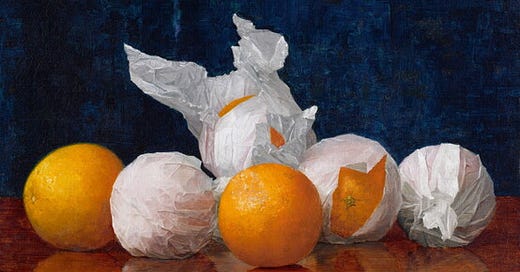



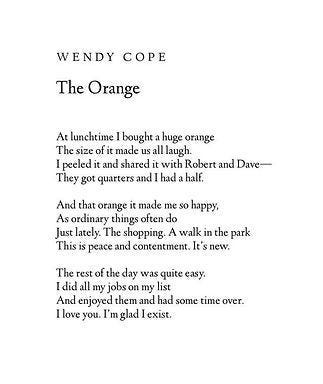

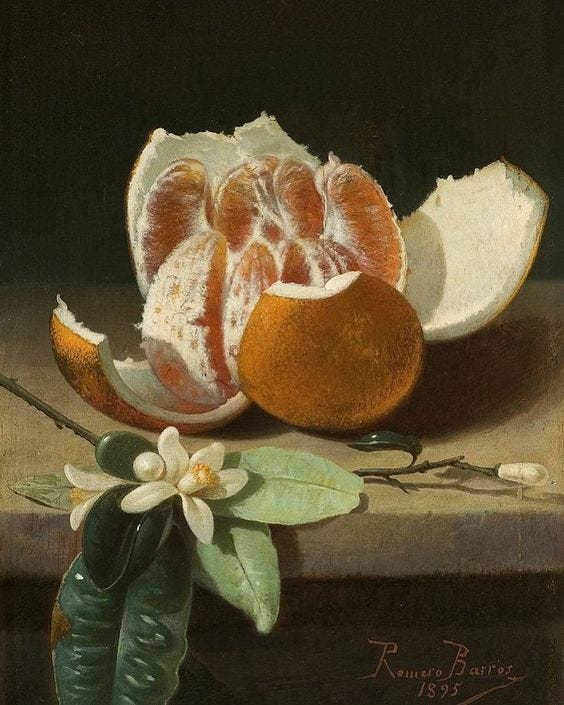
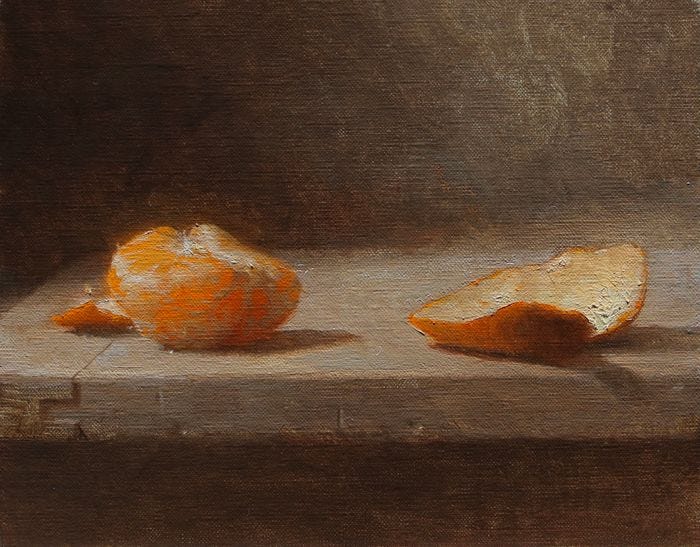

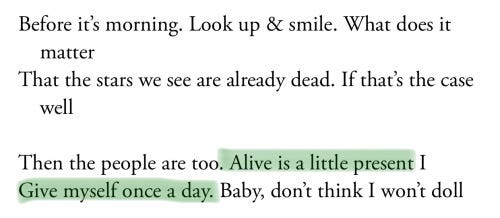

Reading your work is like a breath of fresh air, I'll never get tired of it!
Simply wonderful, and Citrus sweet 🍊